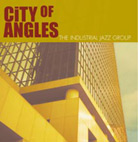August 2002
I don’t mean to suggest that Durkin is too formal in his approach. His compositions often start with a given theme or form and then move off in unexpected directions. "Theme From City of Angles," for example, sounds at first like a triumphal march. After a few bars, Durkin varies the time signatures and begins subverting the form with sly humor and exploring the melodic possibilities the aggressive rhythms offer. He introduces elements that anyone familiar with marching bands will recognize, such as martial drumming and a glockenspiel, but the time and musical textures shift as the band states variations on the opening theme. Scott Steen’s trumpet solo begins ominously over drums and bowed bass, then changes to a progressively happier mood as an ascending chord progression builds to the closing section of the song. While a selection like "Theme From City of Angles" shows Durkin playing with or deconstructing form, other songs are made up of sections that seem unrelated but flow together with a logic that feels inevitable. "Tuxedo Trouble" travels through several permutations of its opening theme before it shifts into a very stark section where Cory Wright solos on bass clarinet over two chords played by vibes, sax, and bowed bass. The final section, which is dominated by the vibraphone and a brief turn by mezzo-soprano Lauri Goldenhersh, sounds like an aggressive parody of Carl Orff’s Schulwerk. The closing section differs vastly from the opening, but you reach the end fully confident of where the composer has led you. You can follow where Durkin’s going because there’s almost always a melody you can follow -- he’s unusually generous to the listener for someone who might be described as avant-garde. Durkin’s erudite wit reveals itself in song titles like "The Most Adaptable of All Weed Species" or "Anger Management Class" and in the disc’s liner notes, where, for instance, he describes "Full on Freak" as "An attempt at psychedelic Mingusian crime-jazz." The tune is in part a very witty short history of crime-film music, from '40s film noir to '60s detective shows. There’s a terrific moment when an electric guitar plays a low-register melody against a farfisa organ, evoking '60s TV shows like Peter Gunn. What makes the composition more than a novelty is that it does contain passages that pay homage to Mingus and to great jazz written for film by composers like Ellington (Anatomy of a Murder) and Johnny Mandel (I Want to Live!). It demonstrates how the language of profound musical thinkers such as Mingus and Ellington filters down to pop culture through a medium like film. Durkin is such a skilled writer that in a tune like "Full On Freak," he can balance pop culture with more profound musical ideas and make them blend together without being ironic or condescending. I think he’s clearly aware that the portions of "Full On Freak" that are a tribute to Mingus are more interesting than the references to '60s detective-show music. He isn’t trying to dumb-down Mingus or other great jazz composers, but he also isn’t trying to convince us that disposable television theme songs have any great value beyond the memories they might evoke. I think he was amused by what might happen when he combined the two elements, and it’s his outstanding melodic ability that makes the experiment work. Durkin’s joy in making music makes his work such a pleasure to listen to. Even the compositions here that have a more serious edge to them, such as "Void When Detached" or "Anger Management Classes," are filled with the confident bounce of a musician who embraces melody and likes the things he finds in it. I should point out that Durkin is aided by ten musicians of outstanding ability, including Evan Francis (who made key contributions to Hardcore) on alto and flute, Eldad Tarmu on vibes, and Daniel Glass on drums. These are demanding tunes to play and it’s the skill of the musicians on City of Angles that makes them work. City of Angles is less overtly a jazz disc than hardcore, although there are tracks and passages that swing hard. In the end, however, I’d be hard-pressed to label it as anything but jazz. As I thought about whether Durkin’s music needs to be categorized, I remembered something Nat Hentoff wrote in the liner notes to European Windows, a Stuttgart Symphony Orchestra recording of compositions written by John Lewis: "There remains the music to be heard. I would counsel you to react first to the music itself, and only afterward to concern yourself with trying to label it -- if you must." GO BACK TO: |
 Industrial Jazz Group - City of Angles
Industrial Jazz Group - City of Angles![[Reviewed on DVD]](../format/regcd.gif) The
Industrial Jazz Group is a Los Angeles-based jazz ensemble led by pianist/composer Andrew
Durkin, whose influences range from the well known (Frank Zappa, Charles Mingus) to the
relatively obscure (Bob Graetinger, Raymond Scott). His influences, however, are less
important than the fact that he takes what he needs from the approaches of other composers
and musicians and integrates them into his own work. He appears to be as interested in the
discoveries made by composers like Orff or Satie, for example, as he is in the innovations
of jazz musicians. The result is as exciting and, above all, melodic as it is challenging.
The
Industrial Jazz Group is a Los Angeles-based jazz ensemble led by pianist/composer Andrew
Durkin, whose influences range from the well known (Frank Zappa, Charles Mingus) to the
relatively obscure (Bob Graetinger, Raymond Scott). His influences, however, are less
important than the fact that he takes what he needs from the approaches of other composers
and musicians and integrates them into his own work. He appears to be as interested in the
discoveries made by composers like Orff or Satie, for example, as he is in the innovations
of jazz musicians. The result is as exciting and, above all, melodic as it is challenging.